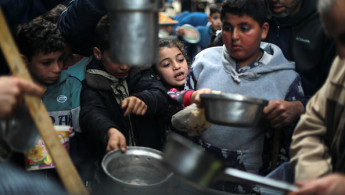Gaza's poor families struggle this Ramadan amid poverty and soaring prices
As prices and poverty rates are dramatically increasing, thousands of Palestinian families in the coastal enclave have struggled during this Islamic holy month of Ramadan.
Speaking to The New Arab, Jomana al-Ashqar, a 44-year-old mother of nine from the al-Shatea refugee camp in western Gaza, described how it has become harder for her and her family to survive.
During Ramadan, Muslims generally observe a strict daily fast from dawn to sunset, preparing various delicious dishes and sweets to break their hours-long fast.
But for Jomana and her family, it has been nearly impossible to do so since her husband had an accident and lost his job in 2010.
"Our life turned upside down as we lost the only source of income," said the middle-aged woman to TNA. "After complicated procedures that took three years, I began to receive about US$500 as financial assistance from the PA-led Social Affairs Ministry every three or four months."
Even though the financial budget can barely help Jomana to keep her family afloat on ordinary days, she has not received it for more than five months. Jomana obtained some money from her relatives and neighbours, she limited her purchases to basic food needs such as vegetables, rice, sugar, tea, and bread without buying any meat.
"The markets in Gaza experienced a remarkable increase in prices of all goods, particularly with poultry, which costs about US$25 to buy three chickens," she said.
"I cannot afford to cook a chicken for my family for six days in a row (…) instead, I prepared some dishes of frozen bovine meat imported from Israel as a cheaper replacement," she added.
More than half of Gazans live under poverty line due to Israeli blockade: NGO report https://t.co/YlA7ViIznJ
— The New Arab (@The_NewArab) January 25, 2022
Ensaf Dohan, a 64-year-old mother of seven from Gaza city, who did not receive the $US 200 from social affairs for more than four months, faces similar dire conditions.
"I do not have any other source of income as my husband is illness elderly man," she told TNA. "I mostly depend on soup and some rice to prepare the daily Ramadan iftar dinner."
"I cannot cook every day because we do not have enough money to buy the basic ingredients of the dishes. I prefer to keep some money to give to my two grandsons who live with me," the elderly woman said.
Jomana and Ensaf live in tiny dilapidated houses rife with dampness, their walls falling apart.
On the other hand, Khitam Ibrahim, a 39-year-old mother of four, lives in better conditions because she receives a $US 400 monthly salary.
Nevertheless, she also has been struggling in the face of the rapidly increasing prices in the local market.
"In the past, my salary was enough for me to prepare meat meals in addition to Qatayef sweets three or four times a week, but now I can only provide them once a week," Ibrahim noted to TNA.
"The prices of all goods have doubled in Gaza, and we do not know what to do in such difficult circumstances that we are going through," she added.
New taxes on imported goods in Gaza by Hamas provokes anger from residents, merchantshttps://t.co/ccMD0E01VS
— The New Arab (@The_NewArab) July 20, 2022
Gaza merchants attributed the soaring prices to new taxes and customs hikes on various goods imported into the coastal enclave recently imposed by the ruling Hamas movement.
"Some taxes on imported and other goods reached 120 per cent, and this increases the burdens of both traders and clients at the same time," Hani al-Rifi, a merchant of fruit and vegetables, told TNA.
"Because of the new taxes, we incurred heavy losses and limited profits, which forced us to increase the prices. Meanwhile, the clients will reduce the number of goods they buy," he remarked.
In Gaza, poverty rates among the local population reached 64 per cent, food insecurity rates rose to 70 per cent, and unemployment rates hit 50 per cent, according to official statistics issued by the Commerce Chamber in Gaza in 2023.
"The current unprecedented rates reflect the disastrous effects of the Israeli blockade imposed on the coastal enclave since 2007," Maher al-Tabaa, head of the Commerce Chamber in Gaza, said to TNA.





 Follow the Middle East's top stories in English at The New Arab on Google News
Follow the Middle East's top stories in English at The New Arab on Google News


